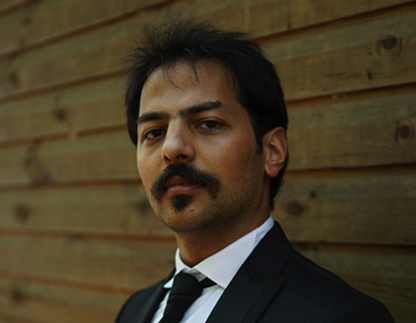I would suggest young researchers choose their area and projects based on their curiosity and work on what they are excited about.”
Ibrahim Tanriover
PhD Candidate in Electrical and Computer Engineering

Ibrahim Tanriover is a PhD candidate in Electrical and Computer Engineering in the McCormick School of Engineering. He is currently researching nanophotonic systems and devices with a special focus on metasurfaces. Ibrahim has extensive experience in design and modeling of nanophotonic devices, including metamaterials, lasers, excitonic interactions, and deep learning.
How would you describe your research and/or work to a non-academic audience?
My research can be divided into three related parts. First, I design optical components such as lenses. Yet my designs are different from the optics that we use daily. I am trying to miniaturize these optical components to very small sizes that are even thinner than a human hair. These optical components, metasurfaces, can lead to better and smaller cell phone cameras, cheaper and thinner AR/VR glasses, and better contact lenses in the near future. Second, to make things faster and immune to human error, I am trying to teach computers to solve these problems and make these designs themselves. I am using machine learning algorithms to achieve this. I aim to create a computer program that can design a wide range of these very small optical components, metasurfaces, much faster than current methods. Although it sounds full of doing, the third and most significant part of my research is understanding the interactions of light and matter. I use computer simulations to dive deep into the systems and understand what is happening.
What do you find both rewarding and challenging about your research and/or work?
One of the most rewarding yet challenging things in my research is to make an actual device. It takes three main steps: design, fabrication, and characterization. Neither design nor characterization is easy. However, for me, the most tiresome step is to fabricate the device. You have to work with nanometer precision and thus, have very limited control during the fabrication process. Every factor can create significant deviations. As a result, it takes either deep experience or numerous trial and error sessions to fabricate a device. My reward is having an actual, working device. The feeling is hard to explain yet I can say that it is worth it.
What is the biggest potential impact or implication of your work?
The metasurface concept has various current and potential applications including medical, entertainment, and defense. They can find applications wherever optics are used. Today’s consumer optics, such as cell phone cameras or AR/VR glasses, are starting to take advantage of them. In the future, the collaborative effort of researchers can lead to applications like better and improved contact lenses that can address multiple vision problems simultaneously or even AR-assisted artificial eyes.
How do you unwind after a long day?
I prefer watching a few episodes of some TV series, reading several pages from a novel, and Turkish tea.
What books are on your bedside table?
I prefer novels about history and politics, usually from Turkish literature. On my “to read” list, I have Kucuk Aga and Firavun Imani from Tarik Bugra, and a biography of Muhsin Yazicioglu, who was a very important political figure in Turkey; Muhsin Baskan from Yavuz Bulent Bakiler.
What did you originally want to be when you grew up?
I changed my mind several times. I used to want to be a general when I was in elementary school, then, for a short period, being a scientist was my dream. My latest decision was on engineering, which I decided at the beginning of high school. The research allowed me to be a scientist and engineer at the same time.
What advice would you give your younger self or someone considering a similar path?
I would suggest young researchers choose their area and projects based on their curiosity and work on what they are excited about. Research requires hard work, and most importantly, includes huge ambiguities. A researcher must be strongly motivated to overcome these challenges, be successful, and, most importantly, be happy. I like the famous quote by Confucius, "Choose a job you love, and you
will never have to work a day in your life." So, choose an area you like.
Published: August 2, 2022
If you know a graduate student, postdoctoral trainee, graduate faculty member, staff member, or a member of our TGS alumni population who would make a great candidate for our TGS Spotlight Series, please complete this brief TGS Spotlight Series Nomination Form.